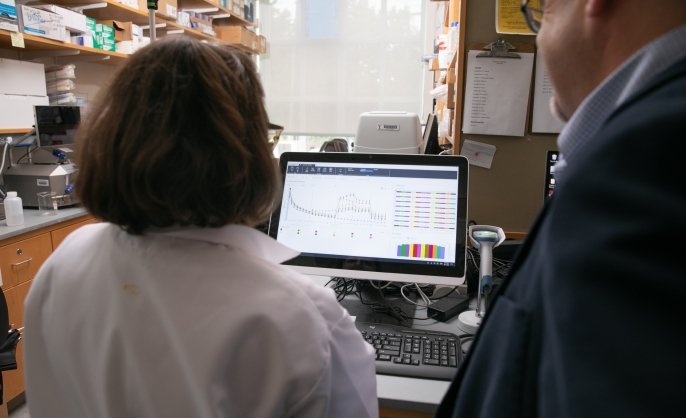Long reads sequencing: PacBio
Primary contact
About the service
The KMSR offers long-read sequencing solutions from PacBio and Oxford Nanopore. Compared to short-read sequencing technology, they provide the following advantages:
- Long reads with no amplification.
- Direct detection of epigenetic modifications on native DNA.
- Direct sequencing through regions of the genome inaccessible or difficult to analyze by short-read platforms.
- Uniform coverage of the genome as they are not as sensitive to GC content as short-read platforms.
PacBio single molecule real-time (SMRT) sequencing system
The Sequel II System provides the advantages of SMRT sequencing and now makes it more affordable for all scientists to drive discovery with comprehensive views of genomes and transcriptomes.
What are HiFi reads?
HiFi reads are produced using circular consensus sequencing (CCS) mode on PacBio long-read systems. HiFi reads provide base-level resolution with 99.9% single-molecule read accuracy.
HiFi reads can be used across a wide range of SMRT sequencing applications, from whole genome sequencing for de novo assembly, comprehensive variant detection, epigenetic characterization, RNA sequencing and more.
How are HiFi reads generated?
Provides access to even more highly accurate long reads.
Operates in two modes:
- circular consensus sequencing (CCS) mode to provide base-level resolution with >99% single-molecule read accuracy for the detection of all variant types from single nucleotide to structural variants.
- using the continuous long read (CLR) sequencing mode to enable high-quality assembly of even the most complex genomes, can expect half the data in reads >50 kb and the longest reads up to 175 kb.
Applications
- Whole genome sequencing: De novo genome assembly
- Single molecule real-time (SMRT) sequencing
- Targeted Sequencing: No Amp Targeted sequencing utilizes a CRISPR\Cas9 system
- Eliminate PCR bias and errors
- Sequence through entire repeat expansions with base-level resolution
- Quantify repeat numbers in normal- and mutant-expanded alleles
- Identify interruption sequences
- Characterize somatic mosaicism
- RNA sequencing
- Discover new genes, transcripts and alternative splicing events
- Improve genome annotation to identify gene structure, regulatory elements, and coding regions
- Increase the accuracy of RNA-seq quantification with isoform-level resolution
- Epigenetics
- Single molecule real-time (SMRT) sequencing directly detects epigenetic modifications by measuring kinetic variation during base incorporation. By capturing these modifications simultaneously with sequence data, this method eliminates the need for special sample preparation and additional sequencing.
- Single molecule real-time (SMRT) sequencing directly detects epigenetic modifications by measuring kinetic variation during base incorporation. By capturing these modifications simultaneously with sequence data, this method eliminates the need for special sample preparation and additional sequencing.
Available to Yale researchers & external researchers
Core websiteSpecifications
Sample submission
Please contact Guilin Wang or Evelyn Ng for PacBio service request.
Sample requirements
Ensure all samples are shipped in dry ice and are clearly labeled. Pacific Biosciences recommends resuspending your samples in either water or 10 mM Tris-HCl. Please see the table and list below for additional DNA quantity and quality requirements and recommendations.
| Sequencing application | Minimum quantity needed (per library) |
250 bp to 3 Kb insert library preparation | 250 ng - 2 µg |
3 - 10 Kb insert library preparation | 2 µg - 5 µg |
10 - 20 Kb insert library preparation | 10 µg - 20 µg |
Recommended characteristics of DNA suitable for single-molecule sequencing
- Minimal DNA quality: OD 260/280 and OD 260/230 should be 1.8-2.0
- Must be double-stranded. Single-stranded DNA will not be made into a SMRT cell template in the template preparation process and can interfere with quantitation and polymerase binding.
- Has undergone a minimum of freeze-thaw cycles.
- Has not been exposed to high temps (>65°C for more than one hour can cause a detectable decrease in sequence quality).
- Has not been exposed to pH extremes (<6 or >9).
- Does not contain insoluble material.
- Does not contain RNA.
- Has not been exposed to intercalating fluorescent dyes or ultraviolet radiation.
- Does not contain chelating agents (e.g., EDTA), divalent metal cations (e.g., Mg2+), denaturants (e.g., guanidinium salts, phenol), or detergents (e.g., heme, humic acid, polyphenols).
Rates
As of 7/1/23
| Service | Yale user | Non-Yale user |
| PacBio library prep (10-20Kb/30Kb) | $459 | $622 |
| PacBio IsoSeq lbrary prep | $529 | $773 |
| PacBio SMRT cell sequencing | $1623 | $2148 |
